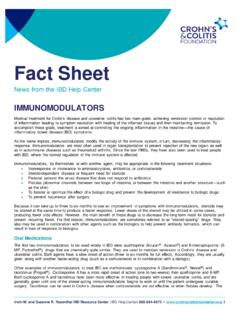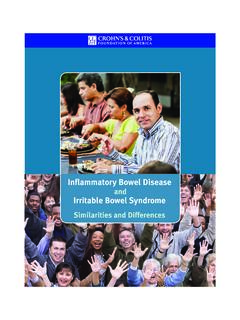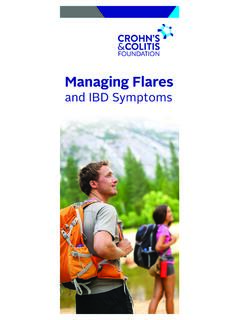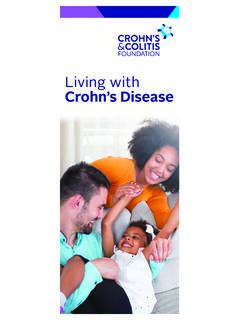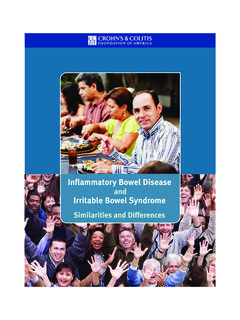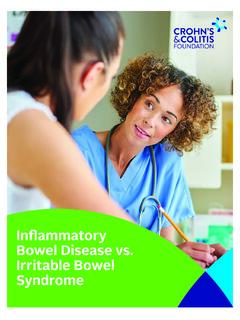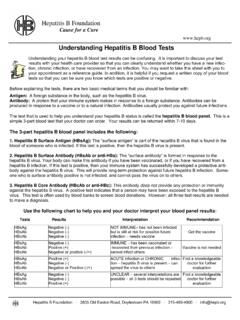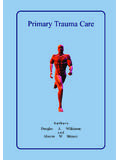Transcription of Biologics Fact Sheet - 01 - Crohn's & Colitis …
1 Biologics Medical treatment for Crohn s disease and ulcerative Colitis has two main goals: achieving remission (control or resolution of inflammation leading to symptom resolution) and then maintaining remission. Over the last several years, new treatments called Biologics have been available for the treatment of inflammatory bowel disease (IBD) and other inflammatory diseases. These treatments are called Biologics because, unlike chemical medications, they are made out of materials found in life. Biologics are antibodies grown in the laboratory that stop certain proteins in the body from causing inflammation.
2 Biologic therapies offer a distinct advantage in IBD treatment because their mechanisms of action are more precisely targeted to the factors responsible for IBD. For example, unlike corticosteroids, which affect the whole body and may produce major side effects, biologic agents act more selectively. These therapies are targeted to particular proteins that have already been proven to be involved in people with IBD. Anti-Tumor Necrosis Factor Agents Biologics known as anti-tumor necrosis factor (anti-TNF) agents bind and block a small protein called tumor necrosis factor alpha (TNF-alpha) that promotes inflammation in the intestine as well as other organs and tissues.
3 All anti-TNF medications have been shown to not only reduce the symptoms of IBD, but also result in healing of inflamed intestine. While anti-TNF medications are not effective for every individual, many patients benefit from this class of medication. It may take up to 8 weeks after starting an anti-TNF to notice an improvement in symptoms, though many experience more immediate improvement. Examples of anti-TNF medications include: Adalimumab (Humira ) is a prescription medicine shown to induce and maintain clinical remission in patients with moderate to severe Crohn s disease and ulcerative Colitis .
4 Adalimumab is given as a subcutaneous injection under the skin of the abdomen or thigh. Once instructed by a healthcare professional, the patient or family member can administer it at home. The injection process takes about 10 seconds. Typically, when starting adalimumab patients will perform 4 injections for their first dose (4 pens, 160mg), then two weeks later they will perform 2 injections (2 pens, 80mg). Thereafter, patients will perform 1 injection (1 pen, 40mg) every two weeks. Certolizumab pegol (Cimzia ) is another self injected anti-TNF used to reduce the signs and symptoms, as well as maintain clinical response, of moderate to severe Crohn s disease.
5 Patients treated with certolizumab pegol usually receive an injection every two weeks for the first three injections. Once benefit has been established, it is usually given once every four weeks. Depending on the physician s orders, it is injected under the skin by either a healthcare professional (typically a nurse) or the patient. Golimumab (Simponi ) is indicated for the treatment of adult patients with moderate to severe ulcerative Colitis who are unable to wean off steroids or who have had an inadequate response to, or intolerance to, other ulcerative Colitis medications.
6 Golimumab is usually injected every four weeks after two starter doses. Once instructed by a healthcare professional, the patient or family member can administer it at home. Infliximab (Remicade ) has been approved for the treatment and maintenance of remission of moderate to severe Crohn s disease and ulcerative Colitis (in adults and children). It is also approved for reducing the number of draining enterocutaneous and rectovaginal fistulas and maintaining fistula closure in adult patients with fistulizing disease. It is given by an intravenous infusion lasting approximately two to four hours.
7 The first three doses are given more closely together, at 0, 2, and 6 weeks, and thereafter usually every six to eight weeks. Integrin Receptor Antagonists These Biologics prevent the cells that cause inflammation from moving out of blood vessels and into tissues by blocking a protein on the surface of those cells. Examples of this type of medication include: Natalizumab (Tysabri ) has been approved for inducing and maintaining clinical response and remission in adult patients with moderate to severe Crohn s disease who have had an inadequate response to, or are unable to tolerate, other forms of therapy.
8 It is infused into a vein at a certified infusion center and is usually given once every four weeks. It takes about one hour to receive the entire dose. Natalizumab works throughout the entire body. Natalizumab users carry an increased risk of a severe brain condition called progressive multifocal leukoencephalopathy (PML), resulting from infection with the John Cunningham (JC) virus. It is important to be tested for JC virus prior to starting natalizumab; patients who are negative for JC virus have a much lower risk of developing PML. Vedolizumab (Entyvio ) has been approved for inducing and maintaining clinical response and remission and achieving steroid-free remission in adult patients with moderate to severe Crohn s disease and ulcerative Colitis who have had an inadequate response with, lost response to, or were intolerant to an anti-TNF or immunodmodulator; or had an inadequate response with, were intolerant to, or demonstrated dependence on corticosteroids.
9 Vedolizumab works through a mechanism similar to natalizumab but is gut-specific and has not been shown to enter the brain. In large clinical trials, it was not associated with the brain disorder progressive multifocal leukoencephalopathy (PML) that is rarely observed in those using natalizumab (Tysabri). This drug is infused intravenously over approximately 30 minutes at zero, two and six weeks, then every eight weeks thereafter. Risks & Special Considerations While the benefits often far outweigh the risks of biologic medications in patients suffering from IBD, patients should consider the following when using Biologics : Side Effects & Intolerance.
10 Because Biologics are given by intravenous infusions or subcutaneous injections, they may produce redness, itching, bruising, pain, or swelling at the injection site. Other side effects may include: headache, fever, chills, hives and other rashes. Occasional severe allergic reactions may occur. Infections. Because Biologics affect the immune system to help control IBD, Biologics can impact your ability to fight infections. Further, anti-TNF medications increase the risk of developing less common, or atypical, infections. While the majority of patients using Biologics never experience an infection related to the medication, it is important to discuss this issue with your IBD specialist.
